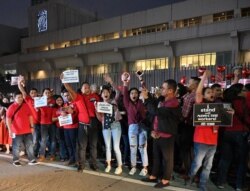Ahead of World Press Freedom Day on Sunday, activists are warning that the coronavirus emergency has seen governments around the world crack down on journalists’ ability to do their jobs at a time when transparency is more vital than ever.
Reporters Without Borders, or RSF, along with Human Rights Watch, Amnesty International and many other rights organizations, is calling on governments to maintain openness and protect the freedom of the press.
North Korea is at the bottom of RSF’s annual “Index on Press Freedom” for the fourth year running. The North’s state-run media have reported zero cases of coronavirus in the country. Scientists have voiced skepticism as neighboring China and South Korea have reported cases.
Across the world, press freedom is increasingly under threat, said Rebecca Vincent of RSF.
“Some of the states that were already cracking down on press freedom have accelerated those crackdowns now," she told VOA. "And others — and actually some of the same states — are targeting journalists who are trying to report the truth about what’s happening in their countries and retaliating against those who do.
"Sometimes we can talk about it in almost a theoretical way, sort of what press freedom means to all of us. But now we can see that actually the absence of press freedom or severe restrictions on it can have at times deadly consequences.”
Hungarian laws
New laws in Hungary threaten five-year sentences for anyone judged to be hindering measures to fight the virus. Journalists there have told VOA they fear being jailed just for doing their jobs.
In other established democracies, including the United States and Britain, activists say government transparency is under threat amid the pandemic. U.N. Secretary-General Antonio Guterres recently voiced his concern, urging governments to be “transparent, responsive and accountable.” In a television address April 23, he said, “Civic space and press freedom are critical.”
Some countries have made improvements, Vincent said. “This year we can look at the Maldives, Malaysia and Sudan as examples of countries that have implemented reforms and risen up very quickly, substantially in the index," she said. "These are all countries where we’ve seen changes of government.”
Safety remains a big concern. RSF says 49 journalists were killed in 2019. “Although fewer journalists in 2019 were killed in conflict zones, a greater number than ever were killed in countries that are meant to be at peace,” Vincent said. “And so, these are very often journalists who are being deliberately targeted.”
European countries make up the top five on the press freedom index. However, there have also been high-profile slayings of journalists, including Lyra McKee in Northern Ireland last year; Jan Kuciak and fiancée Martina Kusnirova in Slovakia in 2018; and Daphne Caruana Galizia in Malta in 2017. Her family is still seeking justice.





